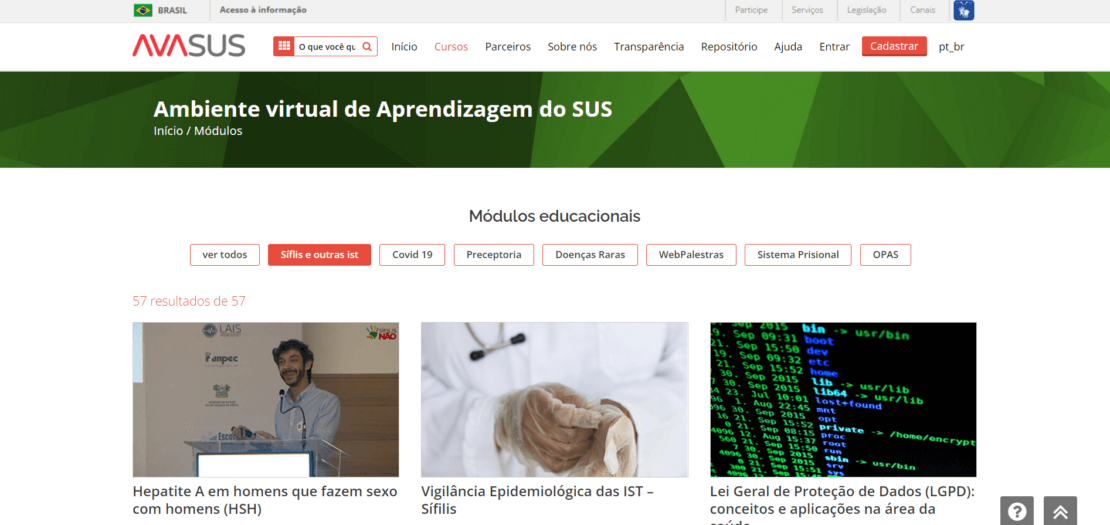By Valéria Credidio – LAIS Communications Office
More than 177,000 people enrolled in the “Syphilis and Other Sexually Transmitted Infections” learning pathway, which consists of 57 online courses and is available in the Virtual Learning Environment of the Brazilian Health System (AVASUS). The numbers prove the commitment of professionals in search of human training in health, solidifying itself as a public policy for Brazil. This learning pathway was specially designed to aid in the fight against the Brazilian syphilis epidemic, declared in 2016 by the federal government.
These are some of the results obtained by a group of researchers from the Laboratory for Technological Innovation in Health (LAIS/UFRN) in partnership with scholars from the University of Coimbra, Portugal. The paper titled “Massive Health Education Through Technological Mediation: Analyzes and Impacts on the Syphilis Epidemic in Brazil” was published in Frontiers, a scientific journal of international relevance.
The work indicates the relevance of Continuing Health Education (CHE) as a tool to respond to public health crises, as well as the capacity of Brazilian researchers to analyze public policy and the tools for its promotion. “The data demonstrate how investment in human training, in the case of health, can aid public-policy making, change work processes and promote better quality health services, rendering the country more resilient to crises,” argued LAIS executive director, Professor Ricardo Valentim, also one of the paper authors.
The learning pathway under analysis is another product of the SNP. This project stems from a partnership between LAIS, the Brazilian Ministry of Health (MoH), the World Health Organization (WHO), and the Pan American Health Organization (PAHO).
With the Portuguese title “Educação em Saúde Massiva por Mediação Tecnológica: Análises e Impactos na Epidemia de Sífilis no Brasil,” the article analyzes the impacts of the learning pathway “Syphilis and Other STIs” in response to the syphilis epidemic in Brazil. It also highlights the educational process of the pathway and its social implications from the perspective of the UN’s 2030 Agenda for Sustainable Development and its Sustainable Development Goals (SGDs).
The study used three different databases to organize the educational data. These were: the AVASUS “Syphilis and other STIs” learning pathway, the National Registry of Healthcare Facilities (CNES) of the MoH, and the Brazilian Occupation Classification (CBO), from the Ministry of Labour.
According to the research, 85% of the professionals participating in the learning pathway courses operate in primary and secondary health care. “These professionals are the target audience of the learning pathway and, therefore, are part of the personnel directly engaged in the health services that confront the syphilis epidemic in Brazil”, highlighted Alexandre Caitano, one of the authors of the paper.
Analyses based on the data strongly suggest that the use of MOOCs (Massive Open Online Courses) for health education, as was done in the “Syphilis No!” project (SNP), can be employed by health authorities as a tool to influence the formulation of public health policies. For Caitano, the findings highlight that in addition to comprehensively educating health professionals, massively open online health education acts as a tool to promote resilience in the response of health systems in times of public health crises.“Therefore, it is urgent that managers and other public health authorities consider this tool as an important element of the public health policy strategy,” he concluded.
According to Professor Carlos Alberto Oliveira, LAIS researcher, professor at the State University of Rio de Janeiro (UERJ), and one of the authors of the article, the results obtained are quite relevant, considering the way they were built, through analyses combining the technological mediation with open, online, and flexible educational offerings and observing the impacts on the work and healthcare process in the health area, having the SNP as the case study. “In this decade, worldwide, international organizations and governments have invested millions of dollars in technology-mediated lifelong learning in health. That’s one more reason for further studies on the impacts on services”. With long experience in lifelong education and training through technological mediation, the researcher did not hesitate to declare: “This was one of the most intense academic work I have participated in,” he finished.
Authors: Alexandre Caitano, Cristina Gusmão, Sara Dias-Trindade, Ingridy M. Barbalho, Philipi Sedir Morais, Gleyson Caldeira-Silva, Manoel Romão, Janaína Valentim, Aline Dias, Joaquim Alcoforado, Carlos Oliveira, Karilany Coutinho, Maria Carmem Rego e Ricardo Valentim.
Link to the article: https://www.frontiersin.org/articles/10.3389/fpubh.2022.944213/full





